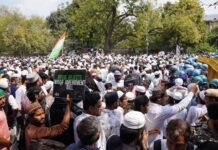The author of the blasphemous novel The Satanic Verses, Sir Salman Rushdie, was stabbed multiple times on stage at an event in New York state but is still alive.
Rushdie was about to give a lecture when a man stormed the stage at the Chautauqua Institution and began stabbing him as he was being introduced, according to an AP reporter who was there.
The author was fell to the floor while the man was restrained. Rushdie was then transported to hospital.
New York Governor Kathy Hochul confirmed that Rushdie is still alive and is being cared for in hospital.
She said: “He is alive, he has been transported, lifted to safety but here’s an individual who has spent decades speaking truth to power, someone who has been out there unafraid despite the threats that have followed him his entire adult life it seems… I want to commend the state police, it was a state police officer who stood up and saved his life, protected him as well as the moderator who was attacked as well. We’re monitoring the situation but he’s getting the care he needs at a local hospital.”
Upon publication of the Satanic Verses in 1988, Muslims worldwide were outraged by a character called “Mahound,” who appears in dream sequences in the novel and was alleged to be “a thinly and perversely disguised representation of the Prophet Mohammed.” The name Mahound was used in medieval Christian plays to represent satanic figures, and some Muslims concluded that Rushdie was implying that Muhammad (pbuh) was a false prophet.
In the book, Rushdie also gave the names of the Prophet’s wives to twelve prostitutes in a brothel. And he invoked a discredited and false tradition – the so-called satanic verses – in which Satan inspired Muhammad (pbuh) to compromise with the people of Mecca and to allow them to continue to worship other deities in an attempt to lure them to Islam.
Subscribe to our newsletter and stay updated on the latest news and updates from around the Muslim world!
Pakistan banned the book in November 1988. In February 1989, a 10,000-strong protest against Rushdie and the book took place in Islamabad, Pakistan. Six protesters were killed in an attack on the American Cultural Center, and an American Express office was ransacked.
As the controversy spread, the importing of the book was banned in India and it was burned in demonstrations in the United Kingdom.
In mid-February 1989, Ayatollah Ruhollah Khomeini, then Supreme Leader of Iran, issued a fatwa calling for the death of Rushdie and his publishers, and called for Muslims to point him out to those who can kill him if they cannot themselves.
In response, the British Conservative government under Margaret Thatcher gave Rushdie round-the-clock police protection. With police protection Rushdie escaped direct physical harm, but others associated with his book weren’t so lucky.
Hitoshi Igarashi, his Japanese translator, was found by a cleaning lady, stabbed to death in July 1991 on the college campus where he taught near Tokyo. Ten days prior to Igarashi’s killing Rushdie’s Italian translator Ettore Capriolo was seriously injured by an attacker at his home in Milan by being stabbed multiple times.
William Nygaard, the Norwegian publisher of The Satanic Verses, was critically injured by being shot three times in the back by an assailant on October 11, 1993 in Oslo. Nygaard survived but spent months in hospital recovering.
The book’s Turkish translator Aziz Nesin was the intended target of a mob of arsonists who set fire to the Madimak Hotel after Friday prayers on 2 July 1993 in Sivas, Turkey, killing 37 people. Nesin escaped death when the mob failed to recognise him early in the attack.
Finally, in 2006, the Iranian government withdrew its support for the carrying out of the death sentence and Rushdie gradually returned to public life.























